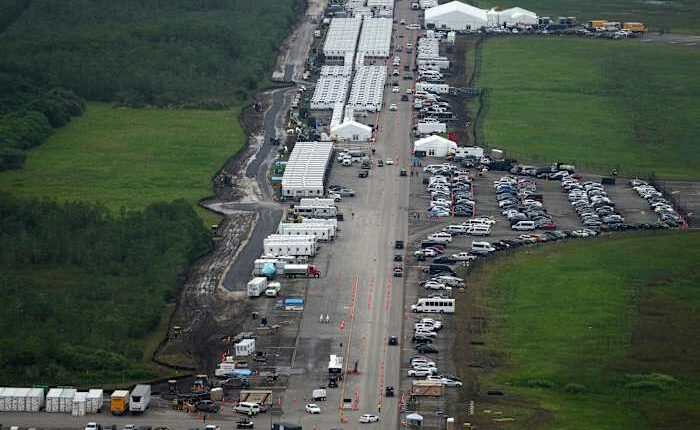Share this @internewscast.com

MIAMI – There have been reports of worms found in the food, toilets unable to flush leading to floors being flooded with waste, and detainees going days without showers or necessary medications. The facility is plagued with mosquitoes and insects, lights remain on throughout the night, and air conditioning units frequently fail despite the tropical climate. Additionally, detainees can only communicate with their lawyers and families via recorded phone calls.
Just a few days after President Donald Trump visited a newly opened immigration detention center in Florida’s Everglades, named “Alligator Alcatraz” by officials, these conditions were reported by those imprisoned inside.
Lawyers, advocates, detainees themselves, and their families are voicing concerns over the improvised migrant detention facility, hurriedly constructed by the administration of Republican Governor Ron DeSantis on an isolated airfield amid swampland. The facility started receiving detainees on July 2.
“These are human beings who have inherent rights, and they have a right to dignity,” said immigration attorney Josephine Arroyo. ”And they’re violating a lot of their rights by putting them there.”
Government officials have adamantly disputed the conditions described by detainees, their attorneys and family members, but have provided few details, and have denied access to the media. A televised tour for Trump and DeSantis showed rows of chain-link cages, each containing dozens of bunkbeds, under large white tents.
“The reporting on the conditions in the facility is completely false. The facility meets all required standards and is in good working order,” said Stephanie Hartman, a spokesperson for the Florida Division of Emergency Management, which built the center.
A group of Democratic lawmakers sued the DeSantis administration for access. The administration is allowing a site visit by state legislators and members of Congress on Saturday, July 12.
Descriptions of attorneys and families differ from the government’s “model”
Families and attorneys who spoke with The Associated Press relayed detainees’ accounts of a place they say is unsanitary and lacks adequate medical care, pushing some into a state of extreme distress.
Such conditions make other immigration detention centers where advocates and staff have warned of unsanitary confinements, medical neglect and a lack of food and water seem “advanced,” said immigration attorney Atara Eig.
Trump and his allies have praised this detention center’s harshness and remoteness as befitting the “worst of the worst” and as a national model for the deterrence needed to persuade immigrants to “self-deport” from the United States.
But among those locked inside the chain-link enclosures are people with no criminal records, and at least one teenage boy, attorneys told the AP.
Concerns about medical care, lack of medicines
Immigration attorney Katie Blankenship described a concerning lack of medical care at the facility, relaying an account from a 35-year-old Cuban client who told his wife that detainees go days without a shower. The toilets are in the same space as the bunkbeds and can’t handle their needs, she said.
The wife, a 28-year-old green card holder and the mother of the couple’s 2-year-old daughter, who is a U.S. citizen, relayed his complaints to the AP. Fearing government retaliation against her and her detained husband, she asked not to be identified.
“They have no way to bathe, no way to wash their mouths, the toilet overflows and the floor is flooded with pee and poop,” the woman told the AP. “They eat once a day and have two minutes to eat. The meals have worms,” she added.
The woman said the detainees “all went on a hunger strike” on Thursday night to protest the conditions.
“There are days when I don’t know anything about him until the evening,” she said, describing waiting for his calls, interrupted every three minutes by an announcement that the conversation is being recorded.
No meetings with attorneys
The detainees’ attorneys say their due process rights are among numerous constitutional protections being denied.
Blankenship is among the lawyers who have been refused access. After traveling to the remote facility and waiting for hours to speak with her clients, including a 15-year-old Mexican boy with no criminal charges, she was turned away by a security guard who told her to wait for a phone call in 48 hours that would notify her when she could return.
“I said, well, what’s the phone number that I can follow up with that? There is none,” Blankenship recalled. “You have due process obligations, and this is a violation of it.”
Arroyo’s client, a 36-year-old Mexican man who came to the U.S. as a child, has been detained at the center since July 5 after being picked up for driving with a suspended license in Florida’s Orange County. He’s a beneficiary of the DACA program, created to protect young adults who were brought to the U.S. as children from deportation and to provide them with work authorization.
Blankenship’s Cuban client paid a bond and was told he’d be freed on a criminal charge in Miami, only to be detained and transferred to the Everglades.
Eig has been seeking the release of a client in his 50s with no criminal record and a stay of removal, meaning the government can’t legally deport him while he appeals. But she hasn’t been able to get a bond hearing. She’s heard that an immigration court inside the Krome Detention Center in Miami “may be hearing cases” from the Everglades facility, but as of Friday, they were still waiting.
“Jurisdiction remains an issue,” Eig said, adding “the issue of who’s in charge over there is very concerning.”
___ Payne, who reported from Tallahassee, Fla., is a corps member for The Associated Press/Report for America Statehouse News Initiative. Report for America is a nonprofit national service program that places journalists in local newsrooms to report on undercovered issues.
Copyright 2025 The Associated Press. All rights reserved. This material may not be published, broadcast, rewritten or redistributed without permission.











